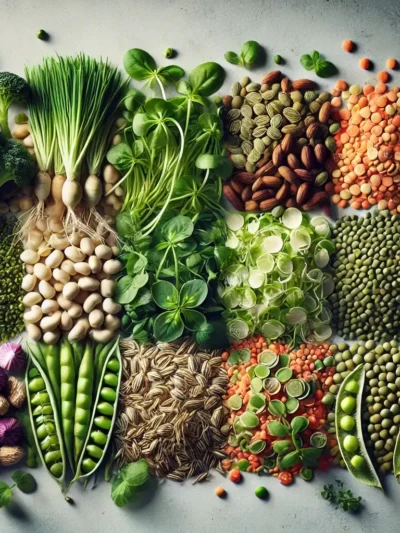Osteoporosis, a silent condition that weakens bones, is a growing public health challenge, especially among postmenopausal women and older adults.
While genetic and hormonal factors play a significant role, nutrition is a key piece in the puzzle of preventing and managing this condition.
The Importance of Macronutrients
Calcium: The Rock of Bone Health
Calcium is the predominant mineral in bone structure, playing a crucial role not only in its formation but also in maintaining bone mineral density. In addition, it is essential for muscle contraction, nerve transmission and blood clotting.
- Dairy sources: Milk, yogurt and cheese are the best-known sources of calcium. Parmesan cheese, for example, is particularly rich in this mineral. A 30g serving of Parmesan cheese contains around 330mg of calcium, equivalent to approximately one-third of the recommended daily intake for adults.
- Dark green vegetables: Kale, spinach, broccoli, and collard greens are excellent vegetable options. One cup of cooked kale contains about 150 mg of calcium, which is a significant portion of the recommended daily intake for adults.
- Fish with bones: Sardines, salmon and herring offer a beneficial combination of calcium and vitamin D. One can of sardines (100g) can contain around 350mg of calcium.
- Legumes: Beans, lentils, chickpeas, and tofu are plant-based sources of calcium, especially when fortified with calcium sulfate. Half a cup of fortified tofu can provide about 250 mg of calcium.
- Nuts and seeds: Almonds, chia and sesame seeds are good sources of calcium, as well as providing fiber, proteins and healthy fats. A 30g serving of almonds contains about 80mg of calcium.
- Fortified foods: Some cereals, plant-based milks and orange juices are enriched with calcium to meet the population's needs.
Calcium Absorption: For calcium to be properly absorbed by the body, a healthy intestinal environment and the presence of vitamin D are necessary. “Vitamin D and bone health” :
Factors such as excessive consumption of animal proteins, sodium and caffeine can interfere with the absorption of this mineral. Vitamin K also plays an important role in the utilization of calcium by the bones.

Protein: The Building Block of Bones
Protein is the main structural component of collagen, the organic matrix of bones.
Furthermore, it plays an important role in hormonal regulation and in the synthesis of enzymes involved in metabolism bone.
- Lean meats: Chicken, turkey and fish are healthy options that are high in protein and generally low in fat. A 100g serving of grilled chicken contains around 30g of protein.
- Eggs: Complete source of protein, containing all essential amino acids. One large egg contains about 6g of protein.
- Dairy products: Greek yogurt and cottage cheese are rich in protein and calcium, as well as probiotics that are beneficial for gut health. One pot of Greek yogurt (150g) can contain about 12g of protein.
- Legumes: Beans, lentils, chickpeas, and tofu are excellent plant-based sources of protein, and they also provide fiber and other nutrients. Half a cup of cooked lentils contains about 9g of protein.
- Nuts and seeds: Almonds, chia and flaxseeds offer high-quality protein, as well as fats healthy and fiber. A 30g serving of almonds contains about 6g of protein.
Protein Balance: Although protein is essential, excessive consumption can interfere with calcium absorption. It is important to maintain a proper balance between protein intake and other nutrients.
Key Micronutrients for Osteoporosis
In addition to macronutrients, several micronutrients play crucial roles in bone health:
- Magnesium: Essential for activating enzymes involved in bone formation, as well as regulating blood pressure and muscle function. Found in seeds (chia, flaxseed), legumes (beans, lentils), nuts (almonds, chestnuts), whole grains (oats, quinoa) and dark green vegetables (spinach, kale).“Role of magnesium in bone health” :
- Potassium: It helps maintain bone mineral density and balance blood pressure. Good sources include bananas, avocados, beans, spinach, and potatoes.“IProtein intake and bone health” :
- Vitamin K: Essential for bone mineralization and fracture prevention. In addition to dark green vegetables (spinach, cabbage, broccoli), it is found in vegetable oils (canola, soybean).
- Zinc: Involved in the formation and maintenance of bone tissue, as well as performing other important functions in the body. Good sources include lean meats (chicken, fish), seafood (oysters, shrimp), legumes (beans, lentils) and seeds (sesame, pumpkin).
- Match: Essential for the formation of hydroxyapatite, the main mineral in bones. Found in animal proteins (meat, fish, eggs), legumes (beans, lentils) and dairy products.
- Vitamin C: Although not directly involved in bone formation, vitamin C is essential for the synthesis of collagen, the organic matrix of bones. Citrus fruits (oranges, lemons), strawberries, kiwis and broccoli are good sources.
Building an Osteo-Protective Diet

- Prioritize fresh and natural foods: Fruits, vegetables, whole grains, lean meats, fish, dairy products and legumes should be the basis of your diet. food.
- Control your sodium intake: Excess sodium can increase calcium excretion, affecting bone health.
- Limit alcohol and caffeine: Excessive consumption can interfere with calcium absorption and increase the risk of osteoporosis.
- Proper hydration: Drink water regularly to aid in nutrient absorption and maintain bone health.
- Consideration of supplements: In some cases, your doctor may recommend supplements of calcium, vitamin D, or other nutrients, especially for people with nutritional deficiencies or specific conditions.
Remember: Nutrition is only one aspect of preventing and managing osteoporosis. Exercise Regular, moderate sun exposure, avoiding smoking and regular medical check-ups are also essential. National Osteoporosis Foundation (NOF):
By adopting a holistic approach that includes a balanced diet rich in essential nutrients, you will be taking an important step towards strengthening your bones and enjoying a full, healthy life. Healthy recipes
| Question | Response |
|---|---|
| What is osteoporosis? | Osteoporosis is a condition that weakens bones, making them fragile and prone to fractures. It is most common in postmenopausal women and older adults. |
| How can nutrition help prevent osteoporosis? | Proper nutrition is essential for maintaining bone density. Nutrients such as calcium, vitamin D, protein, and other micronutrients are essential for bone health. |
| What are the best sources of calcium? | Milk, yogurt, parmesan cheese, dark green vegetables (such as kale and spinach), fish with bones (such as sardines and salmon), legumes (beans and tofu), nuts (almonds) and fortified foods. |
| Why is vitamin D important for bones? | Vitamin D is crucial for the body's absorption of calcium. Without enough vitamin D, calcium is not properly utilized to strengthen bones. |
| Which proteins are beneficial for bone health? | Lean meats, eggs, dairy products, legumes (beans, lentils), nuts and seeds are good sources of protein. Protein is essential for the formation of collagen, which is important for bone structure. |
| What micronutrients are important for bones? | Magnesium, potassium, vitamin K, zinc, phosphorus and vitamin C are important for bone health. They help in bone formation, maintenance of mineral density and collagen synthesis. |
| How to balance protein and calcium intake? | It is important not to consume too much protein, as it can interfere with calcium absorption. Maintain a proper balance between protein intake and other essential nutrients. |
| What to avoid to protect bone health? | Avoid excessive sodium, alcohol, and caffeine intake, as these can negatively affect calcium absorption and bone health. It is also important to control your intake of processed foods and foods high in sodium. |
| How to build an osteo-protective diet? | Prioritize fresh and natural foods, control sodium intake, limit alcohol and caffeine, and stay well hydrated. Consider including supplements as directed by your doctor to complement your diet. |
| What is the relationship between exercise and bone health? | Regular exercise, especially weight-bearing activities and exercises resistance, is essential to strengthen bones and improve bone density. |
| When should I see a doctor or nutritionist? | It's important to consult a healthcare professional for personalized guidance, especially if you have specific conditions, nutritional deficiencies, or need supplements for bone health. |
These questions and answers provide clear, practical insight into how nutrition can impact bone health and osteoporosis management.









